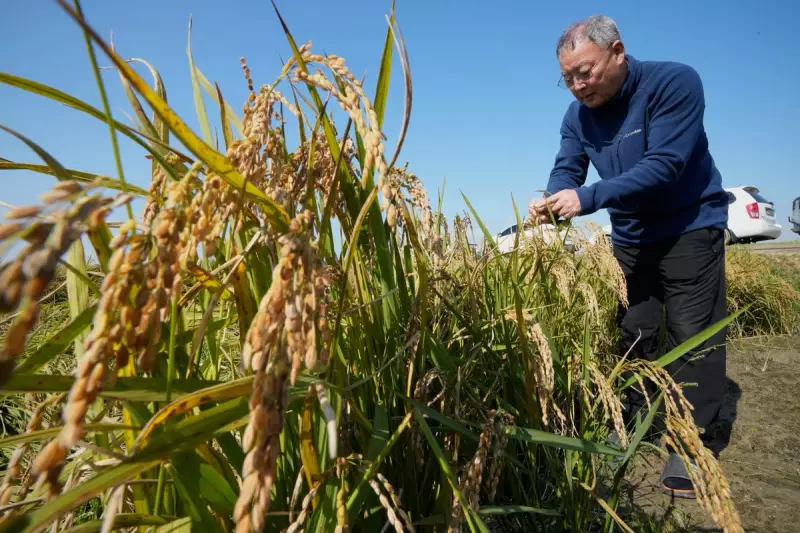
Farmers Take Power Giant to Court Over Climate-Linked Crop Losses
In an unprecedented legal move, five South Korean farmers, including rice grower Hwang Seong-yeol, have filed a lawsuit against the state-owned Korea Electric Power Corp. (KEPCO) and its power-generating subsidiaries. The plaintiffs allege that the utility's heavy dependence on coal and other fossil fuels has dangerously accelerated climate change, directly damaging their agricultural yields and threatening their livelihoods.
A Season of Struggle and a Landmark Legal Challenge
The case, filed on Friday 14 November 2025, represents a growing frustration among agricultural communities who feel they are bearing the brunt of environmental changes. For Hwang Seong-yeol, a farmer with three decades of experience, the recent harvest season was one of his most difficult. He described the unsettling sight of his combine harvester struggling through a muddy paddy, a consequence of an unusually wet autumn that forced an early harvest and led to a significantly reduced yield.
This lawsuit is the first of its kind in South Korea, according to Yeny Kim, a lawyer with the non-profit Solutions for Our Climate, who is representing the farmers. It raises complex questions about whether the role of major corporations in driving climate change can be legally quantified and linked to specific economic losses.
The farmers' plight is set against a backdrop of increasingly erratic weather. A government climate report from April 2025 detailed how extreme weather in 2024, South Korea's hottest year on record, triggered a series of "agricultural disasters." These included summer rains that destroyed thousands of hectares of cropland and intense heatwaves that wreaked further havoc, primarily on rice production.
The Legal Argument and South Korea's Energy Dilemma
The legal team built its case on a quantitative analysis of carbon emissions. Lawyer Yeny Kim's examination of public data revealed that from 2011 to 2022, the KEPCO group was responsible for approximately 30% of South Korea's greenhouse gas emissions and about 0.4% of global emissions.
"Therefore, they should also bear 0.4% of the responsibility for the farmers’ losses," Kim argued. The plaintiffs are seeking initial damage claims of 5 million won (£2,600) per farmer, a figure expected to be adjusted as the case progresses.
Symbolically, they are also asking for 2,035 won (£1) each to pressure the government to phase out coal power plants by 2035, ahead of its current 2040 target. This highlights the core of the issue: South Korea's challenging transition to clean energy. As a manufacturing powerhouse that industrialised later than many Western nations, it now faces international pressure to abandon the very fossil fuels that powered its growth.
Government data shows that in 2024, renewable energy accounted for only 10.5% of the national energy mix. Meanwhile, the five KEPCO subsidiaries in question relied on coal for over 71% of their electricity production. While KEPCO has stated that carbon reduction is a key responsibility and aims to cut emissions by 40% by 2030 from 2018 levels, it declined to comment on the ongoing lawsuit.
Experts point to a significant barrier: KEPCO's mounting debt, which has ballooned to over 200 trillion won (£103 billion) due to decades of policies keeping electricity prices artificially low. This debt severely limits its capacity to invest in grid modernisation and renewable energy sources.
Broader Implications and a Nationwide Agricultural Crisis
While some experts like Professor Yun Sun-Jin of Seoul National University acknowledge the lawsuit's symbolic value, they question whether legal blame can be assigned for a global problem like climate change, especially when the entire population benefits from cheap electricity. However, she agrees the case underscores the urgent need for South Korea to adopt a more effective renewable energy strategy.
This includes deregulating solar investments, expanding offshore wind power, and potentially breaking KEPCO's monopoly on transmission to foster competition. Analysts warn that the country's slow shift to renewables could even hinder its ambitions in advanced semiconductors and artificial intelligence, as global tech giants face pressure to use clean power.
The impact of climate change extends far beyond Hwang's rice field. Apple farmer Ma Yong-un reports using more pesticides as pests thrive in the prolonged heat and humidity. He, like tangerine growers on Jeju island and strawberry farmers in Sancheong, is fighting a daily battle for survival, constantly wondering how much longer he can sustain his livelihood in the face of such instability.





